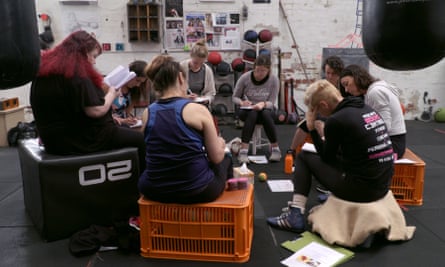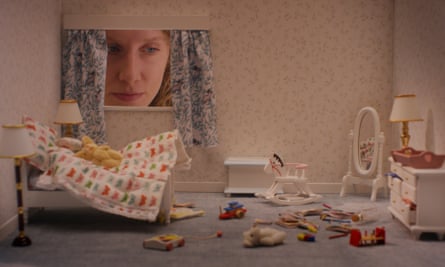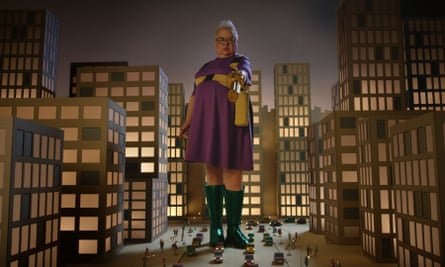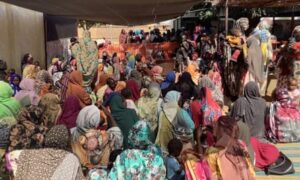In a Melbourne gym, a group sits huddled in a circle, sharing secrets they have carried with them since childhood. One woman reveals the fear that would set in as her parents’ car disappeared down the driveway of her grandfather’s home, leaving her in his care. Another recalls the therapist who cautioned her against disclosing what had happened to her, as the story was “too much, too awful” to hear. Some reflect on the way their trauma silently reverberated as they grew older: an eating disorder in their teen years, or a fear of sex as an adult.
Then they start boxing.
This is Left Write Hook, a unique support group for survivors of child sexual abuse, and the subject of a new documentary premiering at the Melbourne international film festival. In regular meetups caught on camera, around eight women and gender-diverse people come together to sit and write about their experiences, share their stories, then lace up their gloves and let it rip.
Left Write Hook founder Donna Lyon sees boxing as a perfectly logical way to work through complex trauma. “Trauma leaves people feeling powerless,” she says. “So when you move them into sports and activities where they are empowered, it challenges that paradigm.”
Lyon can speak firsthand to the benefits of boxing. After having recovered memories of her own childhood sexual abuse, Lyon entered the ring in search of an outlet for her anger – before finding something else entirely. Having struggled with dissociation, boxing allowed her to connect with her body, making her feel strong, focused and in control. Knowing there were others out there like her, she put the call out and founded the first generation of the group.
“And that’s how it formed – as this very grassroots idea at my local boxing gym,” Lyon says. “But I knew there was this kernel of a really interesting documentary in the project.”

Lyon, who is also an academic at the VCA School of Film and Television, took the idea to document what she was doing to Shannon Owen, a film-maker colleague. Owen sat in on one of Lyon’s early Left Write Hook sessions and immediately knew they had a documentary on their hands.
By that point, she and Lyon had been colleagues for a decade but it wasn’t until then that Owen learned Lyon herself was a survivor. Owen then dug into the statistics on childhood sexual abuse – a 2023 national study found that about one in four Australians aged 16 years and over have experienced child sexual abuse; other estimates say it is one in three.
“I quickly realised that we all know survivors – we may not know that we know them,” Owen says. “But the stats are so prevalent, we interact daily with survivors. That was a profound realisation for me and really spurred me on to want to tell this story.”
Owen and Lyon received research funding from the University of Melbourne to film and measure the wellbeing outcomes of the participants. They advertised for a new round of Left Write Hook participants, this time with the information that their intent was to film the workshop – “so participants knew from day one that we were interested in recording what was happening in the space”, Owen says. The pair filmed on and off for the next two years.

What they captured is startling. Left Write Hook is sometimes a difficult watch – particularly in its raw, nearly 15-minute opening scene, in which participants meet and, for some, disclose their abuse for the first time outside a psychologist’s office. It is unsparing footage, forcing the viewer to listen to stories of abuse that are rarely given a public platform.
But as it unfurls, Left Write Hook becomes a moving portrait of what it looks like to live with, and work through, trauma. Scenes range from often emotional, shakily self-filmed video diaries by participants to high-concept, performative enactments – one woman drives down a driveway, away from a rural property that resembles her grandparents’, this time behind the wheel and in control of her destiny. Another stomps on toy cars as she walks through a diorama of a city, her body made powerful and able to strike back.

The participants were able to opt-out of filming at any point (sure enough, not everyone in that opening scene appears again). A minimal crew was used where possible to reduce intrusion, sometimes just Owen and a female camera operator. Consultation with the participants was ongoing and continues now as they prepare for its premiere at Melbourne international film festival – because while it’s one thing to share your story with a small group, it’s altogether different when you have a national audience.
The biggest benefit of the program, Lyon says, had nothing to do with the cameras but being around other people who “get it”. Their initial research found that the participants of Left Write Hook demonstrated a reduction in PTSD, depression and stress, and an increase in personal agency and resilience; findings that echo that of a Toronto-based organisation which has been studying the effects of trauma-informed boxing on female-identifying survivors of violence for more than a decade.
-
Sign up for our rundown of must-reads, pop culture and tips for the weekend, every Saturday morning
The results are heartening, but Lyon says it doesn’t mean that “one program can fix people”.
“Complex post-traumatic stress disorder can be lifelong, so people can be really up and down with their journeys,” she says. “But I will say that people’s lives have been changed.”
Her work has continued after cameras stopped rolling. Left Write Hook is now a charity and 13 different groups of participants have moved through the workshop already. She has recently committed to another two years of running it while researching its potential benefits with the University of Melbourne.
As Left Write Hook’s release looms, the participants “are all so nervous, but also really excited” to share their stories. Lyon says: “For people that, as children, were never believed, were completely invalidated and were frightened into silence – to now have this incredible prestige and light shone on the issue and our experiences, it’s a really incredible feeling.”
-
Left Write Hook premieres at the Melbourne international film festival on Wednesday, before general release in October
-
In Australia, children, young adults, parents and teachers can contact the Kids Helpline on 1800 55 1800; adult survivors can seek help at Blue Knot Foundation on 1300 657 380. In the UK, the NSPCC offers support to children on 0800 1111, and adults concerned about a child on 0808 800 5000. The National Association for People Abused in Childhood (Napac) offers support for adult survivors on 0808 801 0331. In the US, call or text the Childhelp abuse hotline on 800-422-4453. Other sources of help can be found at Child Helplines International
Source: theguardian.com

















